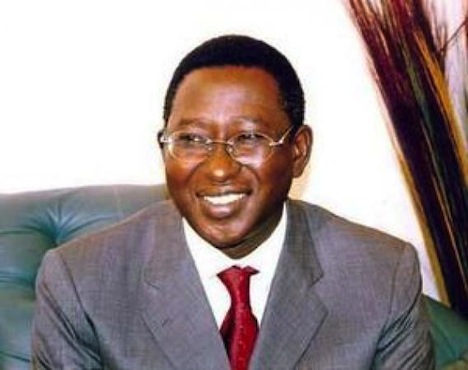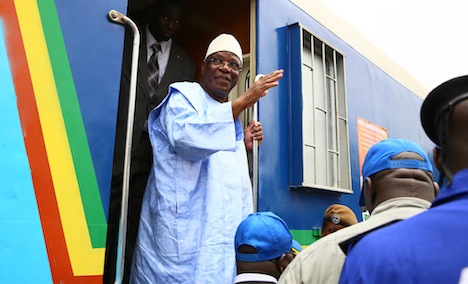Six days after Malians went to the polls, the results are finally in, and, as had been previously reported, former prime minister Ibrahim Boubakar Keïta leads the pack of 27 candidates.![]()
But unlike reports that suggested Keïta would win outright in the first round, he’ll face Soumaïla Cissé, a finance minister in the 1990s under former president Alpha Oumar Konaré and, thereafter, president of the commission of the West African Monetary Union from 2004 to 2011. The August 11 runoff, therefore, will be a partial rerun of Mali’s 2002 presidential election, when Cissé (pictured above) narrowly outpolled Keïta in the first round of the race — the top finisher was Amadou Toumani Touré, who went on to win the 2002 runoff against Cissé with 65% of the vote, and served as Mali’s president until last March’s military coup.
In 2002, it was Keïta’s supporters who were alleging fraud, but this time around, it’s been Cissé, who argued that he would win enough support to deny Keïta a first-round victory.
Keïta won 39.23% of the vote to just 19.44% for Cissé — Keïta’s support base in Bamako, while Cissé won more votes in the country’s interior. The result, however, gives Keïta (or just ‘IBK’) quite a head start. While his failure to win a first-round victory may allow an anti-IBK coalition to emerge, it will also diffuse the growing political tension during the wait for official results. Ultimately, the fact of the Cissé-Keïta runoff will make the final result that much more legitimate for whichever candidate emerges victorious. Mali’s next president will face the hard task of negotiating a permanent peace with Tuareg separatists in northern Mali, to say nothing of reinvigorating Mali’s economy.
Though the election, held just months after French military forces liberated the north from largely radical Islamist control, was arranged hastily, and was marked by several flaws, the vote brought a turnout in excess of 51%, much higher than in any other previous Malian election.
Here’s a closer look at Keïta, a former prime minister of Alpha Oumar Konaré, and the president of Mali’s Assemblée nationale from 2002 to 2007. Until the early 2000s, both Keïta and Cissé were Konaré allies and members of Mali’s largest party (and the party of Konaré and Touré), Alliance pour la Démocratie au Mali (ADEMA, Alliance for Democracy in Mali). But they both split off to form their own parties, essentially vehicles to boost their own candidacies in 2002 and thereafter. Keïta therefore leads the Rassemblement pour le Mali (RPM, Rally for Mali), and Cissé leads the Union pour la République et la Démocratie (URD, Union for the Republic and Democracy).
Perhaps their main difference in 2013 has been their attitude to the March 2012 coup that toppled Mali’s elected government. Keïta, who talked three times with Amadou Sanogo, the military captain who led the coup against Touré, has been sometimes nuanced in his criticism of the coup. Cissé, on the other hand, has been much more aggressive in his opposition to Sanogo and the coup, and Cissé himself fled Bamako, Mali’s capital, after suffering attacks from soldiers during the coup.
While Cissé has an image as a technocratic expert on economics and has been accused of corruption in the past, Keïta has cultivated an image of a strong leader and an honest broker.
ADEMA’s candidate, Dramane Dembélé, a political newcomer and a loyalist of outgoing acting president Dioncounda Traoré, won 9.59%, while former prime minister Modibo Sidibé, a loyalist of Touré, the former president, won just 4.87%. In fifth place was 43-year-old, Housseini Amion Guindo, a political newcomer from Sikasso, in southern Mali, owns a football club and is formerly the vice president of Mali’s football association. Guindo won 4.63%, and the other 22 candidate in the race won a cumulative 22% of the vote.

